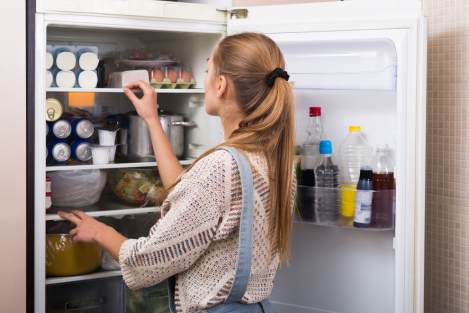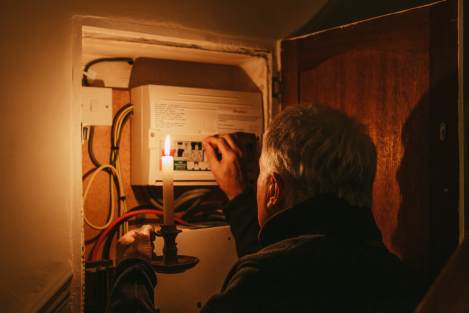
Written by Kayla Jane Barrie Updated on Nov 24, 2025 5 mins read

It's possible for a power outage to happen unexpectedly, leaving us without electricity and our usual comforts. Not only is it frustrating to be without power, but it can also cause concern about food spoilage. This is especially true for perishable items that are kept in the refrigerator or freezer, as they may spoil and create food waste or financial loss.
Some of us may remember the widespread power outage in 2003. On August 14, 2003, the largest power outage in North American history affected over 50 million people in Ontario and the northeastern United States.
If this happens again, do you know what to do if you have a full fridge of spoiled food?
You may be surprised to learn home insurance might offer coverage for food spoilage due to power outages or electrical system failure.
In this blog post, we will explore how your policy can come to the rescue when your groceries are on the line.
Food spoilage coverage can cover you if the contents of your freezer or fridge are spoiled due to a technical malfunction or power outage. It is often included in tenant, home and condo insurance plans. Not all policies are created equal – some may have different exclusions or limits that will be clearly outlined in your agreement, which is important to keep in mind.
Power outages can happen due to various reasons like storms, equipment failures, or maintenance. When there's no power, your fridge and freezer can't keep perishable food items safe. This can cause spoilage of dairy, meats, fruits, and vegetables.
The duration for which food remains safe to eat after a power outage depends on several factors, including the type of food, the temperature at which it is stored, and the length of the power outage. Here are some general guidelines:
It's essential to keep the refrigerator and freezer doors closed during a power outage to retain the cold air and extend the safe storage time.
After a power outage, check your fridge and freezer for spoiled food. If you see mould, notice an unusual smell, or an odd consistency, discard it. When in doubt about specific types of food or power outage duration, it's better to dispose of perishables to avoid foodborne illnesses.
If you experience a power outage caused by a tornado, hurricane, or a covered peril, your home insurance may cover the cost of spoiled food. The cause of the outage may determine whether you will be reimbursed for the loss.
For renters insurance, you may be covered for food spoilage, but only if a covered peril causes the power outage.
Some companies will pay up to a set limit for the loss or damage of frozen food that is caused by an accidental interruption of power. Some insurers will cover you for up to $2,000 if you have food spoilage coverage.
Sometimes, widespread natural disasters may also be covered in the policy. Insurance policies may have limits on reimbursement for spoiled food during power outages. Coverage may only apply after a minimum outage time, such as 24 hours.
Always read your policy thoroughly and ask your provider any questions about what is included or excluded from your policy – you may also need to pay a deductible, which may impact your decision to process a claim or eat the costs.
Here are three steps to follow to submit a claim for spoiled food to insurance:
If you have a power outage and your food goes bad, take pictures of the spoiled items and make a list of what you threw away. Keep receipts from grocery purchases to show the value of lost items for insurance purposes.
It is possible that certain utility companies may offer reimbursements for spoiled food in cases where they are responsible for a power outage. It is recommended that you reach out to your utility company and inquire about their policy regarding this matter.
Standard home policies exclude coverage for certain perils, such as power outages caused by floods, earthquakes, negligence, wear and tear, poor installation, and equipment breakdowns. If yours excluded spoiled food, you will likely not have your claim accepted.
To protect your appliances, you can add an endorsement such as equipment breakdown coverage to your policy for an additional cost. This will cover the cost of repairs or replacement and may even cover food spoilage.
If food naturally spoils, or you manually disconnect a power supply which leads to a power outage, you will not be covered. Carelessness as a homeowner is not a cause for a claim – so if you missed a bill payment and your power was shut off, you would also not be covered.

While your policy can offer financial relief after the fact, it's also essential to take precautions to prevent food spoilage during power outages. Here are some tips:
Food spoilage refers to food in a fridge or freezer that has gone bad due to an accidental loss of power or mechanical breakdown. Depending on the policy, you will have specific outlines. Some examples include limits up to a set cost, only fridge or freezer spoiled food, or deductibles.
Depending on what food you have in your fridge or freezer, products can last as low as four hours or as long as 24 hours. Meat and dairy often expire faster. Contact your insurer to find out what would be covered by home insurance in Ontario, if you need to claim loss of food from a power outage.
Even if you live in a high-rise, your condo insurance will cover food spoilage under the contents section of the agreement. Similar to homeowner's policies, the cause of the outage will dictate if you are eligible for protection or reimbursement.
Depending on your policy, you may have to pay a deductible for your claim. This amount will vary depending on the limits of your coverage. It may or may not be worth filing the claim depending on the cost of the lost food.
If the power outage has caused damage to your home, you may be eligible for coverage of additional living expenses such as hotel costs.
Personal property coverage can help replace damaged belongings caused by covered perils, such as electronics and appliances damaged by a power surge, up to your policy limits and exclusions. Be proactive and use surge protectors for your electronics to help prevent damage.
Having proper coverage and understanding your contents insurance can reduce the financial impact of power outages that result in wasted groceries. Keep records of losses, and take preventative measures to protect your food and peace of mind. Being prepared is essential for unforeseen circumstances.
| Categories | Home |
|---|---|
| Tags | Homeowners Claims |
Read our insurance blog to get helpful tips, information and news.
Ontario’s Project CHICKADEE dismantled a $25 million auto theft ring. Discover how this massive bust targets export enablers and what it means for rising Canadian insurance premiums.
Think refusing a breath test helps your case? In Ontario, it results in a minimum fine of $2,000 and a criminal record. Compare the penalties and protect your future.
Impaired driving in Ontario is a serious offence. Learn about impaired driving fines, penalties, statistics and other important information all drivers in Ontario need to be aware of before they get behind the wheel.
Learn why parking violations are non-moving, how long they stay on your record, and the serious indirect risk of unpaid tickets.